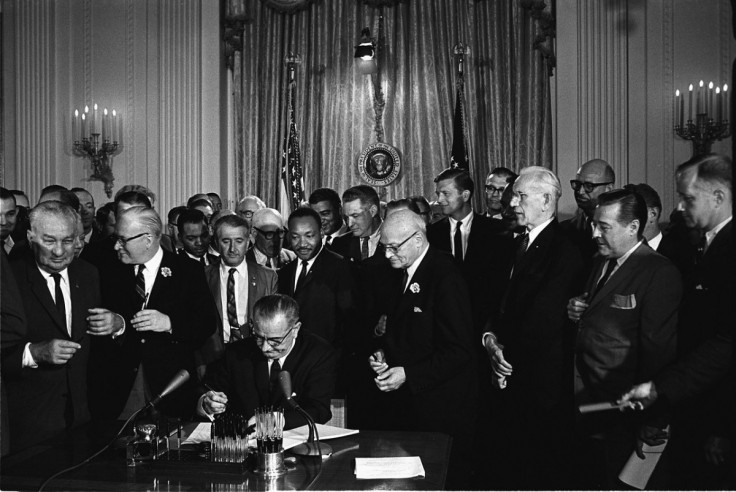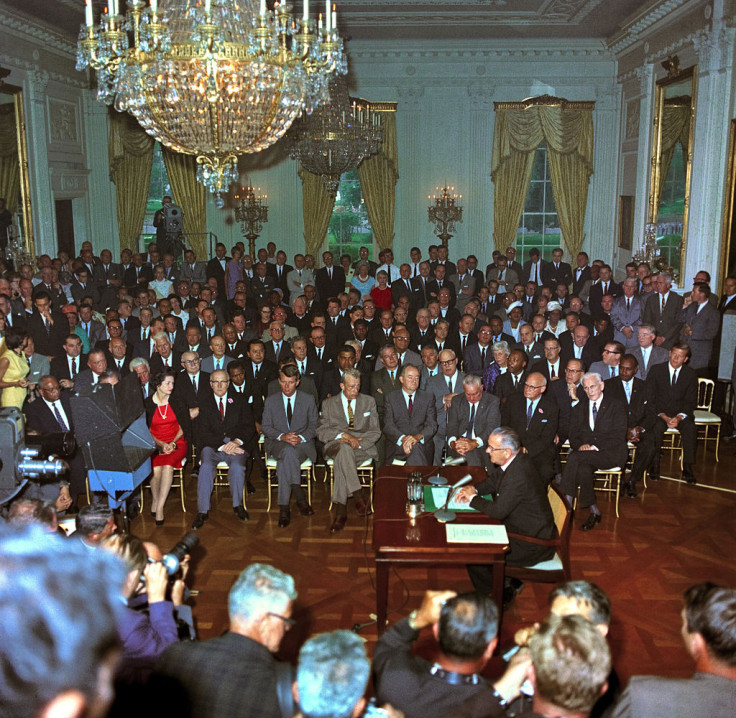Civil Rights Act 50th Anniversary: History of the Milestone in Abolishing Discrimination

Today marks the 50th anniversary of the Civil Rights Act of 1964, a milestone in ending racial discrimination and precursor to a raft of equality and democracy-enhancing legislation in America.
Signed into law at the White House by President Lyndon B Johnson on 2 July 1964, the move outlawed discrimination based on race, colour, religion, sex and national origin. It ended racial segregation in schools, facilities and at the workplace, and brought to an end the unequal application of voter registration requirements.
While the initial powers to enforce the act were weak, Congress later asserted its authority to legislate under several different parts of the US Constitution - in particular, its power to regulate interstate commerce, its duty to protect voting rights and its duty to guarantee all citizens voting rights under the Fifteenth Amendment.
Origins
The legislation was called for by President John F. Kennedy in his famous civil rights speech of 11 June 1963. Asking to give "all Americans the right to be serve in facilities which are open to the public - hotels, restaurants, theatres, retail stores and similar establishments," Kennedy also called for "greater protection for the right to vote."
The speech was delivered after protests from the African-American community, notably the Birmingham Campaign, in which students and children endured attacks by police dogs and high-pressure fire hoses during their protests against segregation.
Kennedy's civil rights bill included provisions to ban discrimination in public accommodations. However, it did not include a number of provisions deemed essential by civil rights leaders including protection against police brutality, ending discrimination in private employment, or granting the Justice Department power to initiate desegregation or job discrimination lawsuits.
After the assassination of Kennedy on 22 November 1963, Johnson, his successor as president, told Congress lawmakers: "No memorial, oration or eulogy could more eloquently honour President Kennedy's memory than the earliest possible passage of the civil rights bill for which he fought so long."

Legislation
The 1964 Civil Rights Act was a large bill with 11 sections - or titles - covering racial segregation and discrimination in places of public accommodation, schools, employment and voting. It was the subject of the longest debate in the history of Congress.
The constitutionality of the legislation was at the time in some dispute, as it applied to the private sector. Some Caucasian business owners claimed Congress did not have the constitutional authority to ban segregation in public accommodation.
Moreton Rolleston, the owner of a motel in Atlanta, Georgia, said: "The fundamental question...is whether or not Congress has the power to take away the liberty of an individual to run his business as he sees fit in the selection and choice of his customers".
In Heart of Atlanta Motel vs United States, the Supreme Court held that Congress drew its authority from the Constitution's Commerce Clause, rejecting Rolleston's claims.
Influence
Despite its lack of influence in the period immediately following its creation, the act had a significant impact on civil rights legislation in the US. It paved the way for future legislation that was not limited to African-American civil rights.
The Americans with Disabilities Act of 1990, which has been called "the most important piece of federal legislation since the Civil Rights Act of 1964", was influenced both by the structure and substance of the previous act.
It also influenced later civil rights legislation, such as the Voting Rights Act of 1965 and the Civil Rights Act of 1968, aiding not only African Americans, but also women.
In 1974, the Supreme Court also ruled that the San Francisco school district was violating non-English speaking students' rights under the 1964 act by placing them in regular classes rather than providing some sort of accommodation for them.
© Copyright IBTimes 2025. All rights reserved.




















